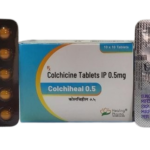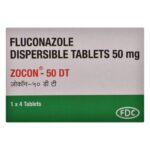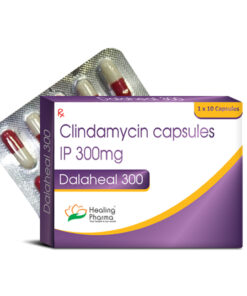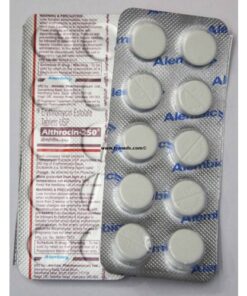Description
Fesoterodine is used to treat a variety of bladder issues, such as neurogenic detrusor overactivity and overactive bladder symptoms include incontinence (lack of bladder control), a strong urge to urinate immediately, or a regular urge to urinate. It affects the bladder’s muscles to expand their capacity for holding pee and stop them from contributing to incontinence.
Only a prescription from your doctor is required to purchase this medication.
There are several dosing formulations for this product:
Extended Release Tablet
Prior to Using
The benefits of a medicine must be evaluated against the hazards when determining whether to use it. You will decide this along with your doctor. Consider the following when using this medication:
Allergies
If you have ever experienced an unusual or adverse reaction to this medication or any other medication, let your doctor know right away. If you have any other allergies, such as those to foods, colors, preservatives, or animals, be sure to let your healthcare provider know. Read the ingredients carefully on the label or container of non-prescription products.
Pediatric
Age-related differences in the effects of fesoterodine on children with overactive bladder symptoms or those under the age of six have not been adequately studied.
Geriatric
Up to this point, appropriate investigations have not revealed any geriatric-specific issues that would restrict the utility of fesoterodine in the elderly. Elderly individuals are more likely to experience unpleasant side effects (such as constipation, dizziness, dry mouth, upset stomach, or urinary tract infection), as well as age-related liver or renal issues, therefore they should be treated with caution when taking fesoterodine.
Breastfeeding
There aren’t enough research on women to determine the harm to the baby of taking this medicine while breast-feeding. Before using this drug during nursing, weigh the potential advantages against the potential drawbacks.
Adverse drug reactions
While some medications should never be combined, in other circumstances two distinct medications may be given together even if an interaction may happen. Your doctor might wish to adjust the dosage in these circumstances, or additional safety measures could be required. It is especially crucial that your healthcare provider is aware if you are taking any of the medications on the following list while you are taking this medication. The following interactions are not necessarily exhaustive but have been chosen because of their potential significance.
Using this medicine with any of the following medicines is not recommended. Your doctor may decide not to treat you with this medication or change some of the other medicines you take.
- Itraconazole
- Potassium
- Potassium Citrate
Using this medicine with any of the following medicines is usually not recommended, but may be required in some cases. If both medicines are prescribed together, your doctor may change the dose or how often you use one or both of the medicines.
- Amantadine
- Amifampridine
- Boceprevir
- Bupropion
- Clarithromycin
- Clozapine
- Cobicistat
- Codeine
- Conivaptan
- Donepezil
- Glucagon
- Glycopyrrolate
- Glycopyrronium Tosylate
- Idelalisib
- Indinavir
- Ketoconazole
- Lopinavir
- Methacholine
- Nefazodone
- Nelfinavir
- Oxycodone
- Posaconazole
- Quetiapine
- Revefenacin
- Ritonavir
- Saquinavir
- Scopolamine
- Secretin Human
- Telaprevir
- Telithromycin
- Tiotropium
- Voriconazole
Additional Interactions
Because there could be interactions, some medications shouldn’t be taken at or close to mealtimes or when consuming specific foods. There could be problems if you combine certain medications with alcohol or smoke. The use of your medication with food, alcohol, or tobacco should be discussed with your healthcare provider.
Other health issues
The use of this medication could be impacted by the existence of additional health issues. Tell your doctor right once if you experience any further medical issues, especially if you:
Use with caution if you have glaucoma, narrow-angle vision, myasthenia gravis (severe muscle weakness), stomach or intestine issues (such severe constipation), or urinary issues (like a blockage). may exacerbate these symptoms.
Patients with glaucoma, narrow-angle, uncontrolled liver illness, significant stomach issues (such gastric retention), or urinary retention shouldn’t use the medication.
Liver or kidney disease: Use with caution. The effects could be more pronounced as a result of the medication’s delayed clearance from the body.
Use Properly
Only use this medication as prescribed by your doctor. Never take it in larger amounts, more frequently, or for a longer period of time than recommended by your doctor.
An information sheet for patients is included with this medication. Carefully read and adhere to the directions in the insert. In case you have any questions, consult your doctor.
You can take this medication with or without food.
A full glass of water should be consumed along with the extended-release pill. Do not eat, split, or crush it.
Negative effects
A medication may have side effects in addition to the ones that are intended. Even though not all of these side effects are likely to occur, if they do, medical treatment may be required.
If you have any of the following side effects, consult your doctor right away:
More prevalent Constipation difficulties Dry mouth
Less frequent
a bladder ache
Swelling or bloating of the face, arms, hands, feet, or lower legs
murky or sludged urine
body aches or pains chills scorching sensation when urinating
cough a decline in how often you urinate
decrease of urine volume
uncomfortable or challenging urinating
breathing difficulties dribbling urine during urination
dry eyes, congested ears, fever, and a constant need to urinate
headache
absence of voice
side or lower back pain
quick rise in weight
runny or congested nose
sneezing sore throat unexpected fatigue or weakness uncharacteristic weight gain or loss tingling in the hands or feet







Reviews
There are no reviews yet.